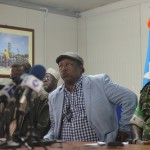Warring clans agree to uphold peace in Marka
Mogadishu, 25 September 2016 – The warring sub-clans of Dir and Hawiye have agreed to come up with an action plan on reconciliation and peace building following the signing of a ceasefire agreement mid this year.
The resolution was made at a two-day meeting, held in Mogadishu and organized by the Interim South West Administration (ISWA), with the support of the African Union Mission in Somalia (AMISOM).
Local leaders, elders, women representatives, militia commanders attended the workshop from the two sub-clans, religious leaders and area members of parliament.
Biyomaal, a sub-clan of the Dir, and Habar-Gidir, a sub-clan of the Hawiye has been involved in clan fighting for months, over power sharing and control of resources. The fights have led to loss of lives, displacement of families and destruction of property.
However, in July, this year, the sub-clans signed a ceasefire agreement, momentarily halting hostilities, to give peace a chance. The ceasefire has so far held, allowing the communities to commence discussions on how to resolve the conflict.
To ensure the ceasefire continues to hold, the protagonists agreed to an immediate deployment of police officers to Marka district to maintain law and order.
Speaking at a press briefing, after their meeting, AMISOM Sector One Commander, Brig. Samuel Okiding, welcomed the decision, saying the delegates had come up with a number of recommendations, which will help resolve the long standing conflict in the district.
“We have all agreed that cessation of hostilities be observed. We have also decided that immediate deployment of a police force to Marka must be implemented so that law and order can be enforced. We have also tasked the political leadership in the country to join us, so that the militias are managed, and we have also agreed to engage the humanitarian agencies so that quick impact projects can reach the people,” Brig. Okiding said.
The South West State Minister for Reconciliation and Constitutional Affairs, Abdulkadir Nur Arale, described the breakthrough as a major step towards lasting peace in the district.
“We want to strengthen the ceasefire and monitoring and also stabilize the situation until we reach a more reliable peace agreement. Right now, we want to try and identify the needs of the people, especially humanitarian needs, particularly quick impact projects that can change the situation and build confidence and trust among the communities living in Marka,” Mr. Arale noted.
Dr. Walters Samah, the AMISOM Political Affairs Officer said if implemented, the resolutions would help stabilize the region.
“In terms of the future, having a brainstorming workshop like this one, bringing together the important stakeholders in Marka area in Lower Shabelle, is so important in that they see each other face to face, identify issues of interest and come out with a plan for peace,” stated Dr. Samah.
Delegates at the workshop were taken through the achievements of the Ramadan committee, which is overseeing the ceasefire; women’s role in conflict resolution; peace and ceasefire monitoring and consequences of inter clan wars in Lower Shabelle, among others.
The violent clashes has plunged the hitherto productive region once regarded as Somalia’s food basket into poverty and chaos, a situation that has been exploited by the Al-Shabaab militia to further acts of terrorism.
A peaceful resolution to the conflict will help stabilize Lower Shabelle, as the country goes into an electoral process. AMISOM has been at the forefront of promoting peaceful settlements to conflicts in Somalia as one way of returning law and order to most regions after decades of civil war.
